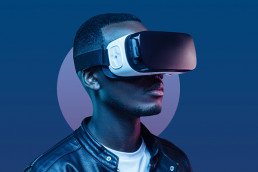Blog Post
From Virtual to Reality
As the world makes the shift away from Zoom meetings and back to in-person activities, the adjustments that we’ve made to our business strategies over the last year and a half will likely be tossed to the wind by most people. Why shouldn’t they be? After all, living room couch to corporate board room isn’t a natural switch. I would posit, however, that we should not overlook the lessons that working and living online for such a long time has taught us.
In the first place, being able to jump from meeting to meeting without leaving your chair has probably taught us some valuable time management skills. It may have taught you that you can squeeze more into a day than you had previously thought possible. Or, maybe it taught you that you need the commute time in between activities to clear your head, gather your thoughts, and prepare for the next meeting.
Personally, working online has taught me that I need to do a better job of structuring my time. I learned the hard way that online scheduling tools don’t include regular lunch breaks, but also that thirty minutes is all you really need to both connect with someone and brainstorm with them about business. Each of these lessons guided my work habits to a more productive place, and will be valuable as I return to in-person activities. But, not everyone has to come away with some profound wisdom about their time management skills, just analyze the parts of your day that you enjoy and see what you can do to continue them when you’re back in the office.
And, as we return to some semblance of normalcy, we’ll also have to consider how the relationships we’ve formed and maintained over the course of the pandemic will change. If you got a new job, hired new coworkers, or made any sort of connection lately, their perceptions of you are likely informed by the virtual images that you have presented to them. That means your clothes, your cluttered desk, and your kitchen cabinets that have been in the background of your Zooms could be most of what your coworkers think of you. It will be up to you to change or preserve their perceptions by the way you carry yourself when you meet them in person.
Even still, socially distanced relationships have had their benefits. For instance, because we have regular and normalized access to technology that helps us communicate, meeting someone in-person for the first time doesn’t have to be as awkward as it used to be. Whereas we’ve always had the option to Facetime or call before meeting someone in person, it is now less unusual to establish a visual report with someone by having a quick Zoom call before you meet them in person. Clearly, business networking saw what online dating was doing right. People decided that the most efficient way to meet new people wasn’t shaking their hand at a networking event, but clicking on their profile.
Furthermore, it might be difficult to resume conducting our business in person, but using the lessons we’ve learned over the past year and a half will certainly help. For instance, if you felt comfortable networking and meeting new people in the comfort of your own home, think about what made you feel comfortable and see if it can translate elsewhere. Or, since the distance has forced many of us to prioritize work in our relationships, try to find areas of common interest with people you already know and make your connections more personal. Resharpening our social skills might be a difficult process, but it’s not one we need to rush.
Because technology has been so crucial to conducting business, we should appreciate the impact that it had on our successes. This pandemic has opened new channels of communication and has shown us that we don’t need to meet in person to get things done. Sometimes a quick Zoom call or slack message is the more efficient way to communicate. And that’s okay. We shouldn’t feel obligated to return to the office or to in-person activities just because we see others doing it. If technology has made your business easier to conduct, embrace it. There is no question that it offers an enormous amount of flexibility to business owners, employees, and customers alike.
Every business-person should assess whether working in person or online makes the most sense for them. If you prefer the convenience of sitting in your living room and taking notes on your computer during a meeting, so be it. Just be aware that your coworkers, business partners, or competitors might not do the same thing, and understand the advantages and disadvantages of working remotely.
A clean-break from the isolated reality of the pandemic might be preferable for some. But for others who don’t want to leave this era having learned nothing from their experiences, it would be helpful to reflect on all the things that working virtually has taught us. The pandemic allowed me to capitalize on my communication skills, my extensive network, and my comfort with technology which all helped my business expand, but it also revealed gaps in Bizydev’s strategy that needed to be filled. I would recommend that everyone be equally self-conscious in their analyses of their pandemic experience.
Introduction to the Bizydev Blog
Welcome to the first-ever post in what is sure to be the most prolific and prolonged blog series in business development history. We’re very excited here at Bizydev to accompany you on your business development journey to a place of sustained growth and financial prosperity. Flash photography is permitted, but please keep your hands and feet inside the vehicle at all times.
In all seriousness, we’ve created this blog because we believe that our experiences and expertise deserve to be shared with the business community as a whole. It’s a soapbox for us to express all the ideas we’re generating and conversations we’re having internally that might be useful to the broader world. By putting out thought-provoking, informational, and interesting content, we aspire to help anyone who’s interested in entrepreneurship or business development get more familiar with the industry. But, beyond that, we just want to create pieces that are compelling and conceptually accessible to anyone. We hope that you get something out of our content, but if not, we thank you for taking the time to engage with us. Happy trails!

